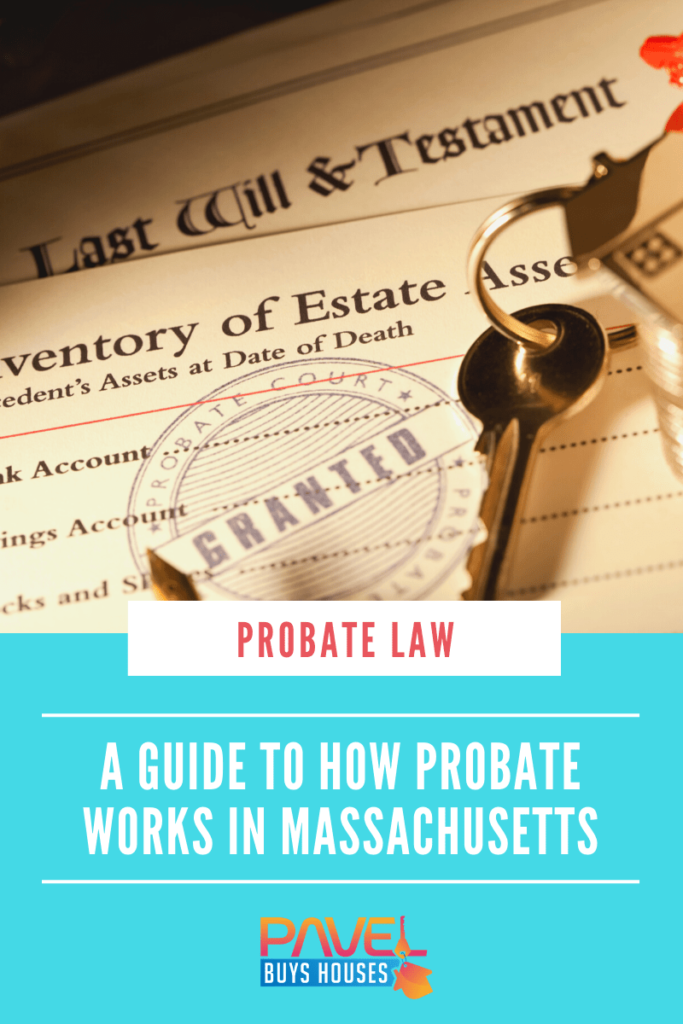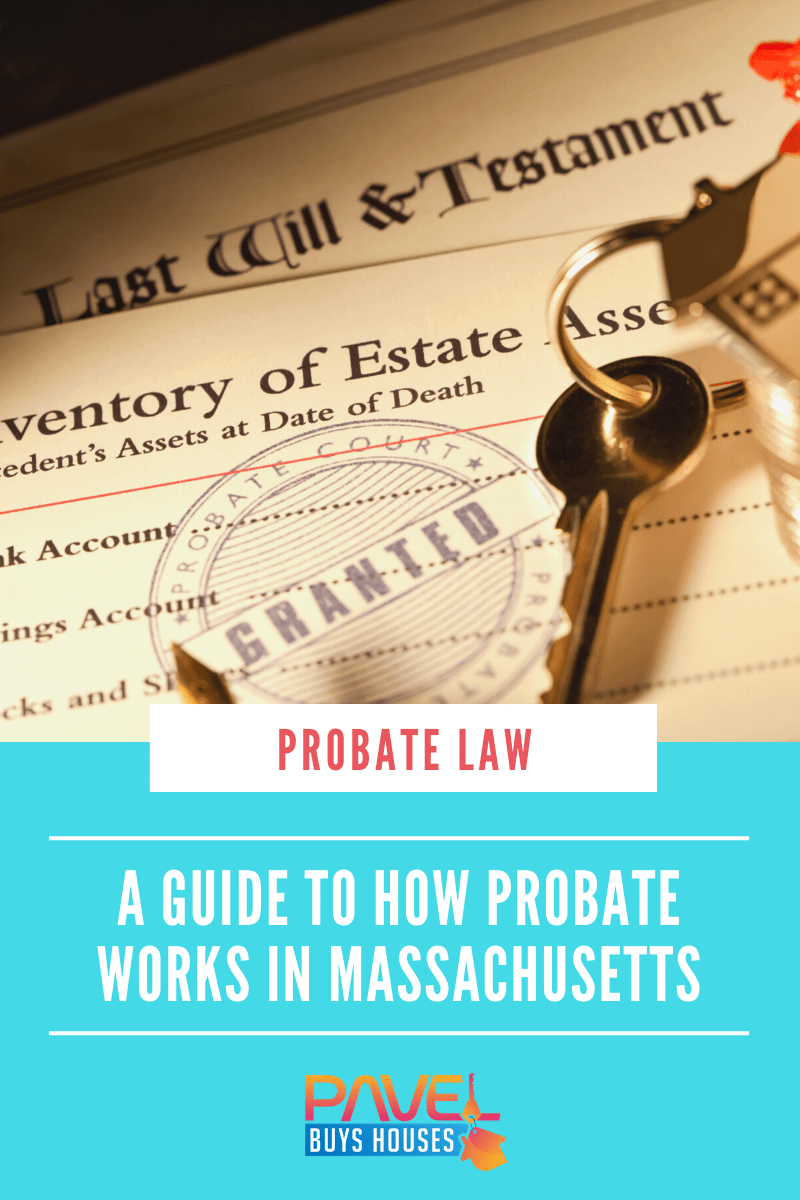
If you are wondering about the process of probate in Massachusetts, it is likely because a loved one has recently passed away and you need to know the next steps for managing this person’s property. Probate is the court observed legal process that occurs after the death of an individual. It allows a close family member the ability to collect the deceased individual’s assets, pay any remaining debt or taxes, and distribute the specified inheritance to each heir. The simplicity of this process can largely depend on the presence of a living will, the amount of debt owed by the deceased, and the size of the estate.
What is the Probate Process in Massachusetts?
Assign a Personal Representative
If the person who passed away left behind a will, an executor, or personal representative, was likely specified in the will as the person to carry out the probate process upon death. If a will was not created, probate can become slightly more complicated. After the death of the family member, the person who should be deemed as the personal representative will file the will and submit a petition to be formally appointed as the executor. If approved, the personal representative will receive a document called, “Letter of Probate” that gives them the authority and duty to supervise the management and distribution of the estate. In exchange for this work performed, the executor has legal right to be compensated a small fee. However, this fee is often refused by the personal representative because it is a taxable income.
Obtain Tangible Property
For the designated executor, the first step is to organize and secure any tangible property. This includes any items that can by physically touched. The value of the belongings will need to be determined, which may require an appraisal. After the worth of each item has been established, the tangible property will need to be kept safe so that it can be allocated during court proceedings at a later date. The executor will need to make sure the family members don’t try to obtain the properties themselves before the value of everything has been assessed and distributed accordingly. Any gifts that were given while the deceased person was alive does not count as part of the estate.
Take Time to Grieve
While you are allocating the tangible property, you will also need to notify Social Security that the family member has passed away. This must be done within one month of the date of death. After these two tasks have been completed, you can pause for a moment to breathe and properly grieve. You don’t have to jump right into probate. Many financial matters can wait for some time before they need to be addressed.
Massachusetts Probate Court Procedure
Before performing necessary tasks for probate court, you need to decide which procedure will be best for your situation according to the Uniform Probate Code of Massachusetts.
The Uniform Probate Code of Massachusetts
The state of Massachusetts has created a set of laws called the Uniform Probate Code, or UPC, in order to make the probate process easier and more affordable. The UPC includes both a formal and informal probate procedure, described below:
Informal Probate Procedure- A court official called a magistrate will oversee the proceedings instead of being conducted by a judge. The executor can pay debts and allocate the estate without oversight of the court. When everything is completed, the personal representative can file a sworn statement to close the estate.
Formal Probate Procedure- This process is typically necessary when there is a dispute among beneficiaries. A formal procedure will need to be conducted by a judge. All actions of the personal representative must be authorized by the judge and interested parties have the right to be notified of these proposed actions.
- Inventory all assets
The executor will have to identify every asset owned by the deceased family member. The value of each asset will need to be determined and documented. The compiled list, called an “inventory,” should be submitted to the court. It is common for the personal representative to open a checking account to be used throughout the process. If you decide to do this, you must first obtain a taxpayer identification number from the IRS.
- Pay remaining bills and debts
One of the primary responsibilities of the executor is to rectify any debt remaining after the family member has passed. In the state of Massachusetts, the personal representative is not obligated to separately notify each appropriate lender of the probate process. However, if a formal probate is deemed necessary, a notice of the probate proceedings must be published through a local news source.
- Filing taxes
A final federal and state income tax return for the deceased family member must be filed by the executor. Typically, this should be submitted before April 15th of the year after the death of the loved one. If the total value of the estate is more than $1 million, a Massachusetts estate tax must be filed before nine months after the date of death. Missing this deadline could lead to severe penalties and fees.
- Distributing the Property
After all debts and taxes have been paid, the assets of the estate can finally be distributed to the heirs. If a will is present, this document determines how the assets will be divided. In the instance that the deceased person died without leaving a will, a law called “intestate succession” will establish who inherits the estate.
- Finalizing the Process
To close the estate, the executor must file a statement indicating the following:
- Adequate time has been given for creditors to state their claims
- All estate assets have been distributed according to the will
- The statement has been delivered to those who received property or are known lenders
- All who inherited assets are aware of the process of how the assets were collected and allocated
Probate Court Fees
Many who go through the process of probate choose to hire an attorney. This will ensure everything is done correctly according to the law. The cost of an attorney can vary. The state of Massachusetts also charges court fees for specific steps during the probate proceedings. These fees can be found here.
How to Avoid Probate in Massachusetts

Family members can take steps while they are still alive to prevent probate court proceedings after death. Here are several ways to avoid probate in Massachusetts:
Create a Living Trust
A trust document is similar to a will and states ownership of property. The family member must assign themselves as the trustee of the trust. The successor trustee can then be identified as the person that receives complete ownership of the trust when the current trustee dies.
Joint Ownership
If an individual owns a property jointly with someone else, the “right of survivorship” clause can allow the surviving owner to take over the property upon death without a probate court proceeding.
Bank Account with Payable-on-Death Designations
A bank account with a “payable-on-death” designation can indicate a beneficiary to take over the account upon death of the original owner.
Transfer-on-Death Form
In Massachusetts, stocks and bonds can include a transfer-on-death form. This authorizes the brokerage company to transfer the account directly to the beneficiary if the owner passes way.
Conclusion
The personal representative manages a lot during the probate process. Having to sell the inherited house on top of everything else can become a huge burden. You will want to work with a real estate expert that has experience in this situation and can help you get top dollar for the house.
At Pavel Buys Houses, we are licensed real estate agents in Massachusetts that can help you sell the house while going through probate proceedings. If you don’t want the time commitment of selling the property the traditional way, we also buy homes fast in Massachusetts (and pay cash while offering fast closings!).
Our priority is making sure you have the advice you need to make the best decision for your situation.
Other Massachusetts Probate Resources
- Selling a House After Probate in Massachusetts
- How to Avoid Probate Court in Massachusetts
- Tips to Sell Deceased Estate Property in Massachusetts
- How to Sell a Deceased Parent’s Home Without Destroying Relationships
- What Happens When You Inherit a House?
- A 5-Step Guide to Selling an Inherited Home

